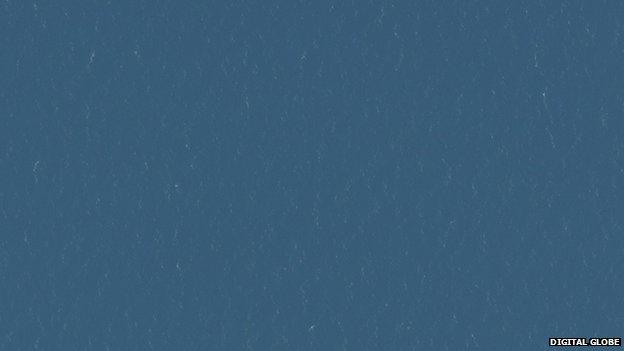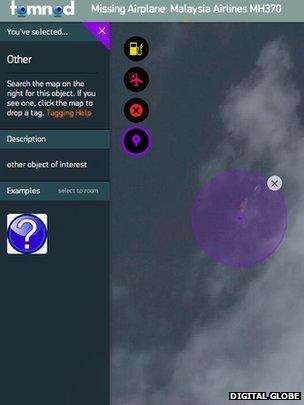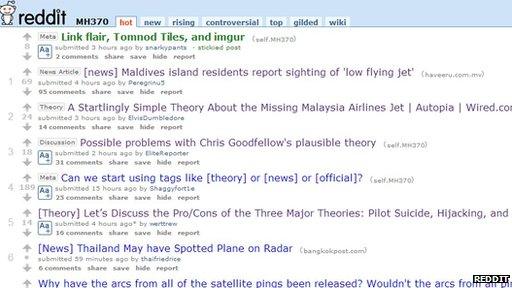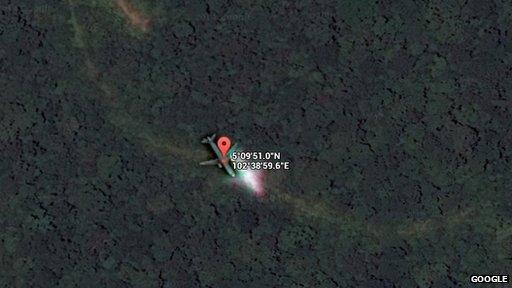Malaysia missing plane: Armchair aeroplane hunters head online
- Published

Needle in a haystack: Most images on Digital Globe's Tomnod system show just an empty sea
One of the most common questions being asked about missing flight MH370 is simply: "How could this possibly happen?"
Hundreds of satellites are in the Earth's orbit, people realise, with many taking imagery, some in staggeringly high quality. Can't we just look at that and find the missing plane?
The simple answer is: "Yes," but it requires a huge effort. And people all around the world are chipping in to help.
As well as the professionals analysing the data, there are now millions of armchair aeroplane hunters hoping to spot something that can provide some clue to the plane's fate.
Crowdsourced spotters
Sometimes it's not expert knowledge that makes a difference, but sheer leg work.
Using the "crowd" - the term given to a large number of mobilised volunteers online - is an effective way to sift through vast amounts of data quickly, creating human resources beyond the reach of any single organisation.

The Digital Globe platform allows tagging of "interesting" things users find
In the hunt for MH370, satellite imagery is at the centre of the effort.
Digital Globe is a company that captures huge amounts of digital imagery, and is able to present it online for people to zoom in on and inspect.
In response to the search for the missing plane, the company launched a crowdsourcing campaign, external that allows people to search satellite images - section-by-section - and highlight anything that looks "interesting". The site offers examples of what certain things could look like from a distance, such as an oil slick or life raft.
The images are so detailed, the company says, that something as small as a briefcase would be visible.
After launch, the Digital Globe site buckled under the pressure of receiving so many visits. The most up-to-date stats provided by the company say that the maps have been viewed 385 million times.
The obvious side effect of this technique is the number of false alarms that will inevitably occur. The firm says about 4.7 million "things" have been spotted. It's unclear how many, if any, are of any worth.
To combat this, the system makes a number of people - about 30 - look at each individual segment.
The images that have been tagged the most by the volunteers are referred up to Digital Globe's experts - who will then determine whether the information should be passed on to the authorities.
At first, the images provided by the company focused on the South China Sea and Gulf of Thailand - keeping in line with the official search area.
Now, with attentions turning to the region around Malaysia's Malacca Straits, the online searchers need to re-focus their efforts.

The Reddit community is busy organising the vast amounts of links about MH370
Expected to come online at some point on Tuesday, new images of the areas now being looked at by the authorities will appear on Digital Globe's platform.
The firm told the BBC these images would be updated every night - and that the satellites could be sent to "look" at a new area with 20 minutes' notice.
Upper hand
On Reddit, the social news-sharing website, a different challenge is being solved - collecting and organising the vast amounts of information being published by the media and posted on social media.
A special section - known as a subreddit - has been set up dedicated to logging information about the missing plane.
Among the links, deep discussion is taking place about the likelihood of various theories being offered from all corners of the net.
Thanks to the way Reddit works - with users being able to vote for good content so it appears more prominently - it has become a useful filter of reliable and interesting news relating to the plane.
In particular, it has helped people who do not have immediate access to mainstream media to find a voice.
Chris Goodfellow, a Canadian former pilot, offered his view on what may have occurred via his own Google+ page, external - the link was shared prominently on Reddit, and other networks, before being picked up and republished by technology magazine Wired.

Not a crash - Google Maps images are sometimes months out of date, the company said
Reddit users have in the past tried to piece together clues to an investigation, but with damaging results - a subreddit set up around the Boston bombings ended up coming to the wrong conclusion about who was to blame.
And there are people determined to deliberately misinform - a fake Facebook profile for MH370's co-pilot, Faruq Abdul Hamid, was shared extensively online.
Furthermore, in the investigation's early stages, Google Malaysia was compelled to release a statement telling people not to look on Google Maps for the plane.
"Yes, the images may be there, but it is not real time," a Google Malaysia representative told Malaysian newspaper the Star, stressing that the pictures on Google Maps could be several months old.
"These images which are captured would sometimes contain images of airplanes usually on its flight path and cannot be presumed as a possible crash site."
Follow Dave Lee on Twitter @DaveLeeBBC, external